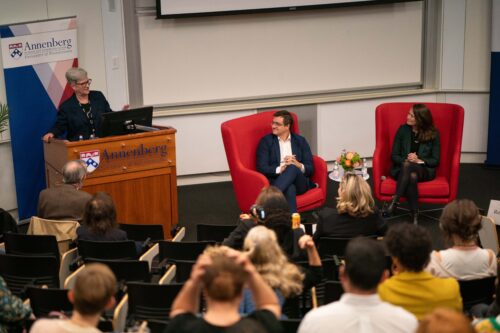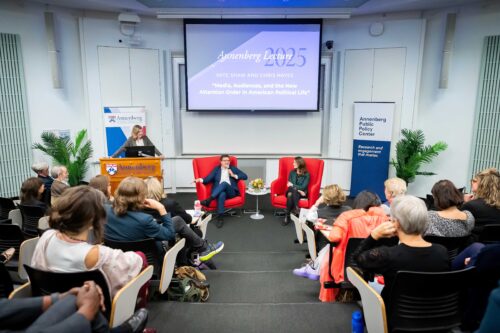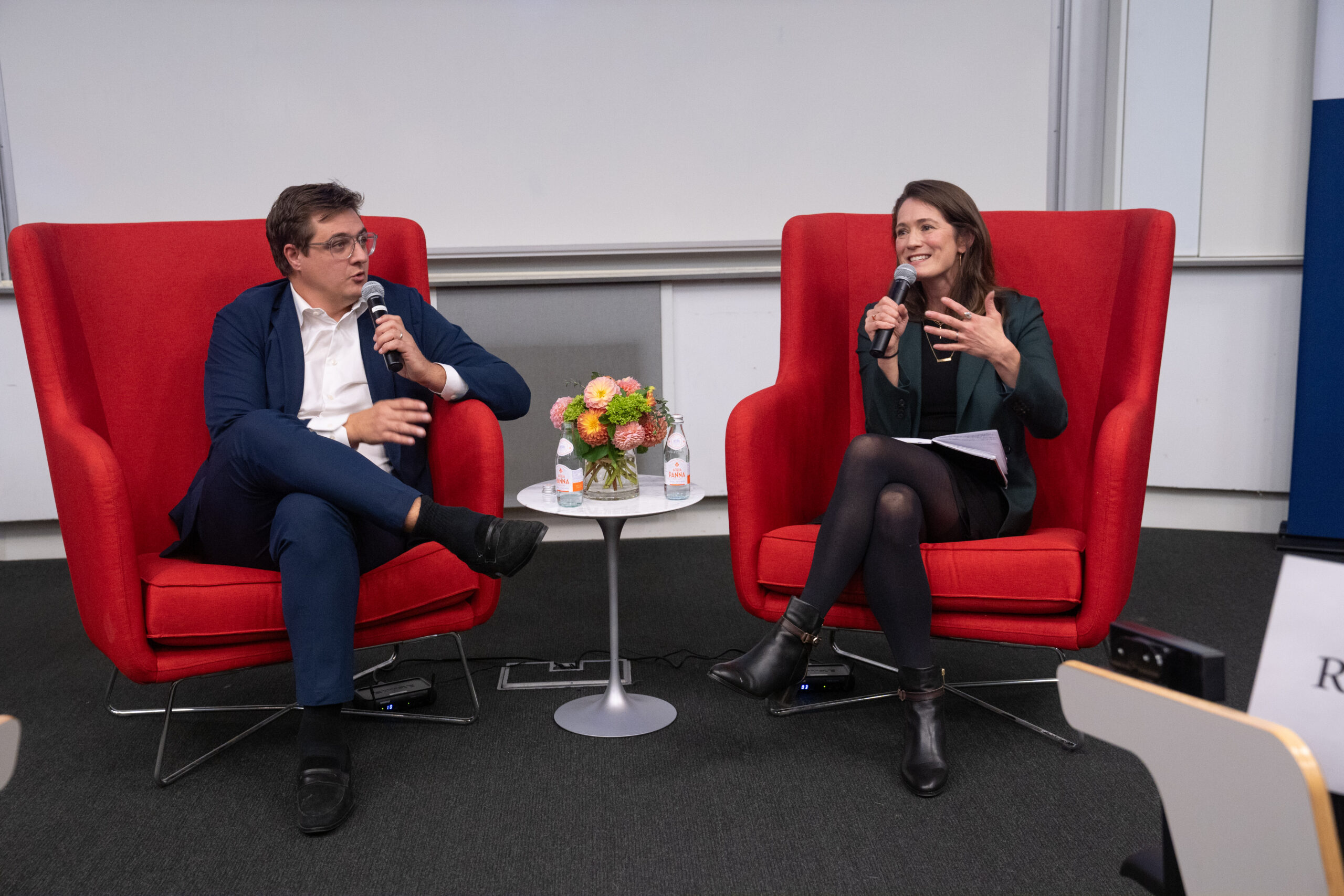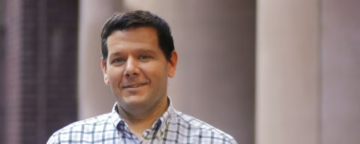Every year, the Annenberg School for Communication and the Annenberg Public Policy Center of the University of Pennsylvania’s annual Annenberg Lecture brings to Penn leading voices from academia, public policy, and media to reflect on the most pressing issues in communication today. This year’s lecture featured a conversation between Kate Shaw, Professor of Law at the Penn Carey Law School, and Chris Hayes, host of MSNBC’s “All In With Chris Hayes” and author of The Sirens’ Call: How Attention Became the World’s Most Endangered Resource.
Drawing from years spent analyzing American politics on television, in print, and through their popular podcasts, Shaw and Hayes examined the challenges the political media face in getting people to pay attention to the news.
“Kate Shaw and Chris Hayes exemplify what the Annenberg Lecture stands for: clear, informed communication in service of democracy,” said Sarah Banet-Weiser, dean of the Annenberg School for Communication. “Their work helps the public understand how media and law shape the world we share.”

In her introduction, Kathleen Hall Jamieson, director of the Annenberg Public Policy Center, praised Hayes and Shaw as a “power couple” who not only critique power and exercise power but also empower their audiences.
The challenge of holding attention
Hayes began by reflecting on the challenge of encouraging audiences to care about structural changes in the government, processes that aren’t hot-button issues but are essential to tracking the health of our democracy, whether that’s gutting the National Labor Relations Board or changing how the Defense Department uses research and development funds.
“Attention has become the defining resource of the age,” he told the audience, “and accruing it is a form of power. It can be very hard to direct mass attention to or to keep mass attention on things that feel more abstract, more process-driven,” he said, noting that policy agendas like the Big Beautiful Bill or extensions of Obamacare insurance subsidies are easier to communicate than structural changes to the Department of Justice or presidential demands to impound funds.
Shaw added that legal reporting faces a similar tension. “Different communicators are struggling with different versions of the same question,” she said, “figuring out a way to communicate what is happening in D.C. in a way that people will understand and can respond to.” On “Strict Scrutiny,” the podcast she co-hosts about the U.S. Supreme Court, she and fellow constitutional law professors work to break down complicated opinions and procedural questions in accessible language, without sacrificing rigor. The justice system can be opaque, but these decisions shape our democracy, and the public needs to know about them, she said.
Understanding the Supreme Court’s ‘shadow docket’
Shaw devoted part of the conversation to a topic that poses a unique challenge for the media: the Supreme Court’s so-called “shadow docket.” Traditionally, the Court’s most consequential cases are argued, briefed, and decided on its merits docket, culminating in signed opinions. However, the Court has been increasingly issuing significant rulings through emergency orders, often without reasons for their decisions, she said.

“In these cases, the court decides without full briefing and argument and often issues these one-sentence orders in the dead of night, not when the Court’s press corps is in the press room ready to report on whatever the Court issues,” she explained. “When the court issues its normal opinions, the press doesn’t know exactly what case will be handed down on what day, but they know that at 10:00 AM, usually on Mondays and Thursdays starting in April, the Court will issue opinions. So, the press corps is ready to digest and communicate to the public about what the Court has decided. None of that is true about the shadow docket.”
Media, democracy, and the open internet
When asked about the affordances of different media platforms, Shaw and Hayes discussed their experience as podcasters, both praising the medium as a way to delve deeply into complex issues.
“Anyone with a microphone and some recording equipment can publish a podcast,” Hayes, who hosts “Why Is This Happening? The Chris Hayes Podcast,” said that this open infrastructure is a vestige of the early internet, not yet dominated by corporate social platforms. He called for a revival of that democratic spirit. “We need to reinvent the next version of the internet that is a return to the open internet before it was closed. The open internet was an unbelievable civilizational advance that also created enormous amounts of value.”
Cultivating hope in uncertain times
Despite the challenges they described, Shaw and Hayes emphasized the need for optimism, describing hope as an essential ingredient in sustaining democratic engagement. It can be easy to slip into doomism, they said, but media practitioners should resist that urge.
Banet-Weiser closed out the event, echoing the pair’s call for hope: “Conversations like this are the source of hope for us, and I do think that this is a real demonstration of the kinds of stories that we need to tell that connect to attention, to urgency, to democracy.”
The annual Annenberg Lecture brings leaders from academia, politics, public policy, and the media to Penn. It combines two previous lectures, the Walter and Leonore Distinguished Lecture in Communication, which began in 1992, and the Leonore Annenberg Lecture in Public Service and Global Understanding in 2006. Both series and the subsequent single lecture honor Ambassador and Mrs. Annenberg, without whose vision and support the Annenberg School and Annenberg Public Policy Center would not exist.
This story by Hailey Reissman originally appeared on the website of the Annenberg School for Communication.



